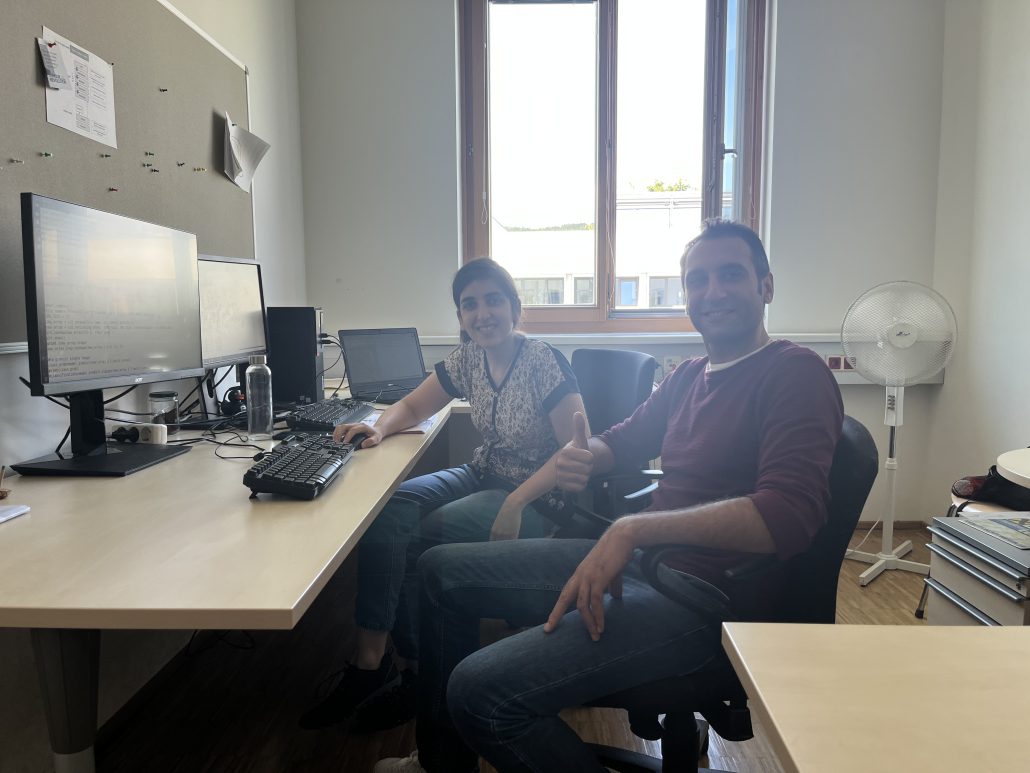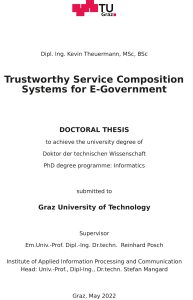From August 16.-19.2022, a CardioHPC project meeting took place in Skopje, Macedonia. Radu Prodan, Andrei Amza and Sahsko Ristvo participated for AAU.

Distributed and Parallel Systems
From August 16.-19.2022, a CardioHPC project meeting took place in Skopje, Macedonia. Radu Prodan, Andrei Amza and Sahsko Ristvo participated for AAU.

 During the period Aug 1st –26th, 2022, Hamza Baniata, a PhD Candidate at the Department of Computer Science, University of Szeged, Hungary, has visited the institute of Information Technology of the University of Klagenfurt, Austria. Under the collaborative supervision by Prof.
During the period Aug 1st –26th, 2022, Hamza Baniata, a PhD Candidate at the Department of Computer Science, University of Szeged, Hungary, has visited the institute of Information Technology of the University of Klagenfurt, Austria. Under the collaborative supervision by Prof.
Attila Kertesz (SZTE) and Prof. Radu Prodan (ITEC), Hamza has performed several research activities related to the simulation of Blockchain and Fog Computing applications, the enhancement of the FoBSim simulation tool, and the integration of Machine Learning with Blockchain technology. The visit was encouraged and funded by the European COST program under action identifier CA19135 (CERCIRAS), in which Attila, Radu and Hamza are active members. The scientific results of this research visit are currently being edited and finalized in order to be disseminated in an international scientific conference.
Project lead/coordination: Radu Prodan
Project partners: IDC Italia, Peracton Limited, Institut Jozef Stefan, Sintef, Universiteit Twente, metaphacts GmbH, Vrije Universiteit Amsterdam, Cineca, Event Registry, Università di Bologna, Robert Bosch GmbH
Abstract: Graph-Massivizer researches and develops a high-performance, scalable, and sustainable platform for information processing and reasoning based on the massive graph representation of extreme data. It delivers a toolkit of five open-source software tools and FAIR graph datasets covering the sustainable lifecycle of processing extreme data as massive graphs. The tools focus on holistic usability (from extreme data ingestion and massive graph creation), automated intelligence (through analytics and reasoning), performance modelling, and environmental sustainability tradeoffs, supported by credible data-driven evidence across the computing continuum. The automated operation based on the emerging serverless computing paradigm supports experienced and novice stakeholders from a broad group of large and small organisations to capitalise on extreme data through massive graph programming and processing. Graph Massivizer validates its innovation on four complementary use cases considering their extreme data properties and coverage of the three sustainability pillars (economy, society, and environment): sustainable green finance, global environment protection foresight, green AI for the sustainable automotive industry, and data centre digital twin for exascale computing. Graph Massivizer promises 70% more efficient analytics than AliGraph, and 30% improved energy awareness for ETL storage operations than Amazon Redshift. Furthermore, it aims to demonstrate a possible two-fold improvement in data centre energy efficiency and over 25% lower GHG emissions for basic graph operations. Graph-Massivizer gathers an interdisciplinary group of twelve partners from eight countries, covering four academic universities, two applied research centres, one HPC centre, two SMEs and two large enterprises. It leverages world-leading roles of European researchers in graph processing and serverless computing and uses leadership-class European infrastructure in the computing continuum.

Kevin Theuermann (TU Graz) defended his theses on July 12, 2022.
Title: Trustworthy Service Composition Systems for E-Government
Prof. Radu Prodan was integrated as an external expert to survey the thesis and discuss it with the candidate as part of the defense.

Title: MCred: Multi-Modal Message Credibility for Fake News Detection using BERT and CNN
Journal: Journal of Ambient Intelligence and Humanized Computing
Authors: Pawan Kumar Verma, Prateek Agrawal, Vishu Madaan, Radu Prodan
Abstract:
Online social media enables low cost, easy access, rapid propagation, and easy communication of information, including spreading low-quality fake news. Fake news has become a huge threat to every sector in society, and resulting in decrements in the trust quotient for media and leading the audience into bewilderment. In this paper, we proposed a new framework called Message Credibility (MCred) for fake news detection that utilizes the benefits of local and global text semantics. This framework is the fusion of Bidirectional Encoder Representations from Transformers (BERT) using the relationship between words in sentences for global text semantics and Convolutional Neural Networks (CNN) using N-gram features for local text semantics. We demonstrate through experimental results a popular Kaggle dataset that MCred improves the accuracy over a state-of-the-art model by 1.10%, thanks to its combination of local and global text semantics.

Title: Matching-based Scheduling of Asynchronous Data Processing Workflows on the Computing Continuum
Heidelberg, Germany | September 6-9, 2022
Authors: Narges Mehran, Zahra Najafabadi Samani, Dragi Kimovski, Radu Prodan
Abstract: Today’s distributed computing infrastructures encompass complex workflows for real-time data gathering, transferring, storage, and processing, quickly overwhelming centralized cloud centers. Recently, the computing continuum that federates the Cloud services with emerging Fog and Edge devices represents a relevant alternative for supporting the next-generation data processing workflows. However, eminent challenges in automating data processing across the computing continuum still exist, such as scheduling heterogeneous devices across the Cloud, Fog, and Edge layers. We propose a new scheduling algorithm called C3-MATCH, based on matching theory principles, involving two sets of players negotiating different utility functions: 1) workflow microservices that prefer computing devices with lower data processing and queuing times; 2) computing continuum devices that prefer microservices with corresponding resource requirements and less data transmission time. We evaluate C3-MATCH using real-world road sign inspection and sentiment analysis workflows on a federated computing continuum across four Cloud, Fog, and Edge providers. Our combined simulation and real execution results reveal that C3-MATCH achieves up to 67% lower completion time compared to three state-of-the-art methods.
Title: An Elastic and Traffic-Aware Scheduler for Distributed Data Stream Processing in Heterogeneous Clusters
Authors: Hamid Hadian, Mohammadreza Farrokh, Mohsen Sharifi, and Ali Jafari
Abstract:
Existing Data Stream Processing (DSP) systems perform poorly while encountering heavy workloads, particularly on clustered set of (heterogeneous) computers. Elasticity and changing application parallelism degree can limit the performance degradation in the face of varying workloads that negatively impact the overall application response time. Elasticity can be achieved by operator scaling, i.e., by replication and relocation of operators at runtime. However, scaling decisions at runtime is challenging, since it first increases the overall communication overhead between operators and secondly changes any initial scheduling that could lead to a non-optimal scheduling plan. In this paper, we investigate the problem of elasticity and scaling decisions and propose a DSP system called ER-Storm. To curb communication overhead, we propose a new 3-step mechanism for replication and relocation of operators upon detecting a bottleneck operator that overutilizes a worker node. The other challenge is to select the proper worker nodes to host relocated operators. By discretizing the input workload, we model the relocation of operators between worker nodes at runtime through a scalable Markov Decision Process (MDP) and use a model-free notion of reinforcement learning (Q-Learning) to find optimal solutions. We have implemented our propositions on the Apache Storm version 2.1.0. Our experimental results show that ER-Storm reduces the average topology response time by 20 to 60 percent based on the rate of input workload (low or high) compared to the R-Storm scheduler and the Online-Scheduler of Storm.
Results of collaborative work in the ADAPT between Austira (FFG) and China (CAS) accteped at flagship conference of IEEE Intelligent Transportation Systems Society
Title: Hybrid On/Off Blockchain Approach for Vehicle Data Management, Processing and Visualization Exemplified by the ADAPT Platform
Authors: Aso Validi, Vladislav Kashansky, Jihed Khiari, Hamid Hadian, Radu Pordan, Juanjuan Li, Fei-Yue Wang, Cristina Olaverri-Monreal
Abstract: Hybrid on/off-blockchain vehicle data management approaches have received a lot of attention in recent years. However, there are various technical challenges remained to deal with. In this paper we relied on real-world data from Austria to investigate the effects of connectivity on the transport of personal protective equipment. We proposed a three-step mechanism to process, simulate, and store/visualize aggregated vehicle datasets together with a formal pipeline process workflow model. To this end, we implemented a hybrid blockchain platform based on the hyperledger fabric and Gluster file systems. The obtained results demonstrated efficiency and stability for both hyperledger fabric and gluster file system, ability of the both on/off-blockchain mechanisms to meet the platform’s quality of service requirements.
Short description: The Intel4EC workshop aims to bring together researchers, developers and practitioners from academia and industry to present their experiences, results and research progress covering architectural designs, methods and applications of AI/ML-enabled Edge-Cloud operations and services. By bringing together these research topics, Intel4EC looks forward to help the community define open standards, AI/ML benchmarks that contribute to experiment reproducibility and systematize the complete management pipeline for a myriad of Cloud-Edge operations.
Organisers: Nishant Saurabh, Zhiming Zhao and Dragi Kimovski